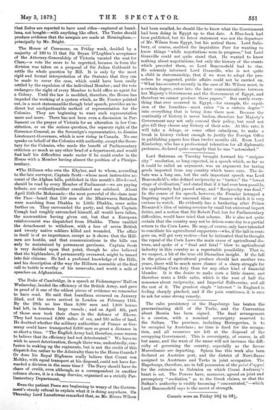Lord Bateman on Tuesday brought forward his " recipro- city
" resolution, so long expected, in a speech which, so far as it could be called an argument, was an argument for taxing goods imported from any country which taxes ours. The de- bate was a long one, but the only important speech was Lord Beaconsfield's, who defined reciprocity as "barter," the "lowest stage of civilisation," and stated that if it had ever been possible, the opportunity had passed away, and " Reciprocity was dead." In the course of his speech, however, the Premier betrayed a lingering regard for unsound ideas of finance which it is very curious to watch. He evidently has a hankering after Prince Bismarck's idea of raising revenue by small but universal import duties, and a notion that Sir Robert Peel, but for Parliamentary difficulties, would have tried that scheme. He is also not quite certain that the country may not be driven some day to a partial return to the Corn Laws. He may, of course, only have intended to conciliate his agricultural supporters—who, if the fall in rents goes on, will get very restive—but he intimated that he thought the repeal of the Corn Laws the main cause of agricultural dis- tress, and spoke of a " final and fatal " blow to agricultural industry in this country as a regrettable possibility. That is, we suspect, a bit of the true old Disraelian insight. If the fall in the prices of agricultural produce should last another two years, there will be much more chance of a sharp struggle for a ten-shilling Corn duty than for any other kind of financial blunder. It is the desire to make corn a little dearer, and therefore rents a little safer, which is the root of half the nonsense about reciprocity, and Imperial Zollvereins, and all the rest of it. The greatest single " interest " in England is feeling sharply pinched, and if the pain continues, it is sure to ask for some strong remedy.


































 Previous page
Previous page